2022年中考英语语法专题冠词课件35张
文档属性
| 名称 | 2022年中考英语语法专题冠词课件35张 | 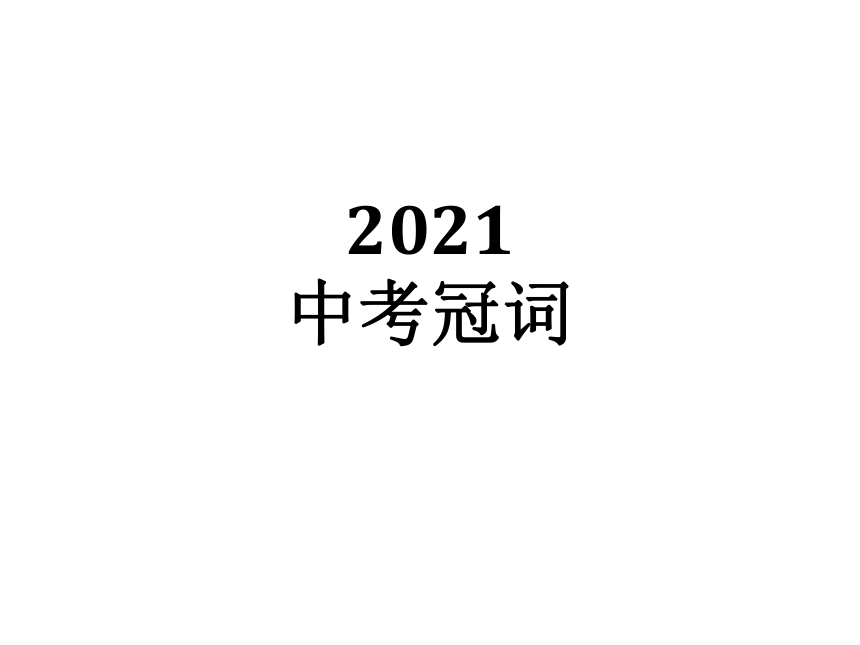 | |
| 格式 | pptx | ||
| 文件大小 | 164.4KB | ||
| 资源类型 | 教案 | ||
| 版本资源 | 通用版 | ||
| 科目 | 英语 | ||
| 更新时间 | 2021-12-26 12:31:49 | ||
图片预览

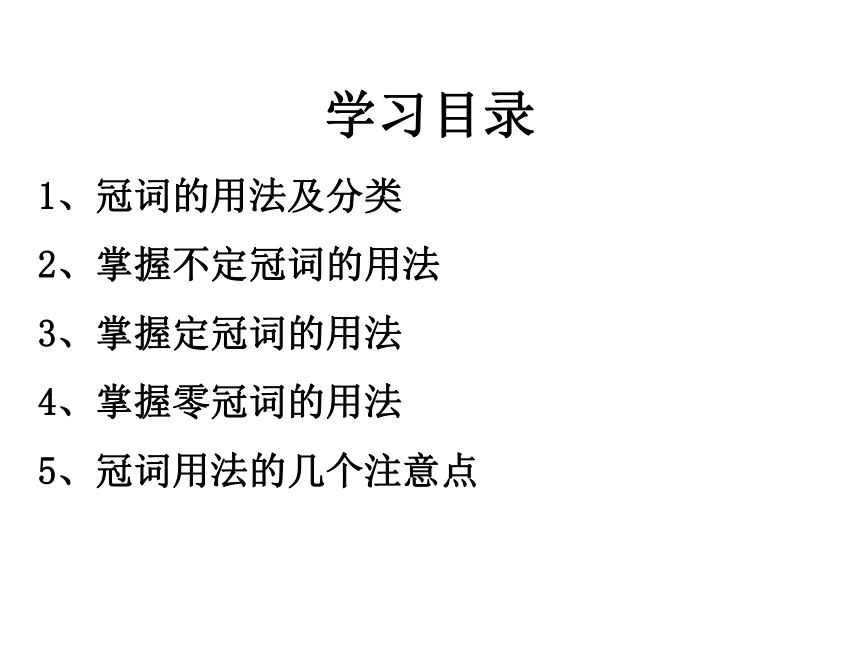
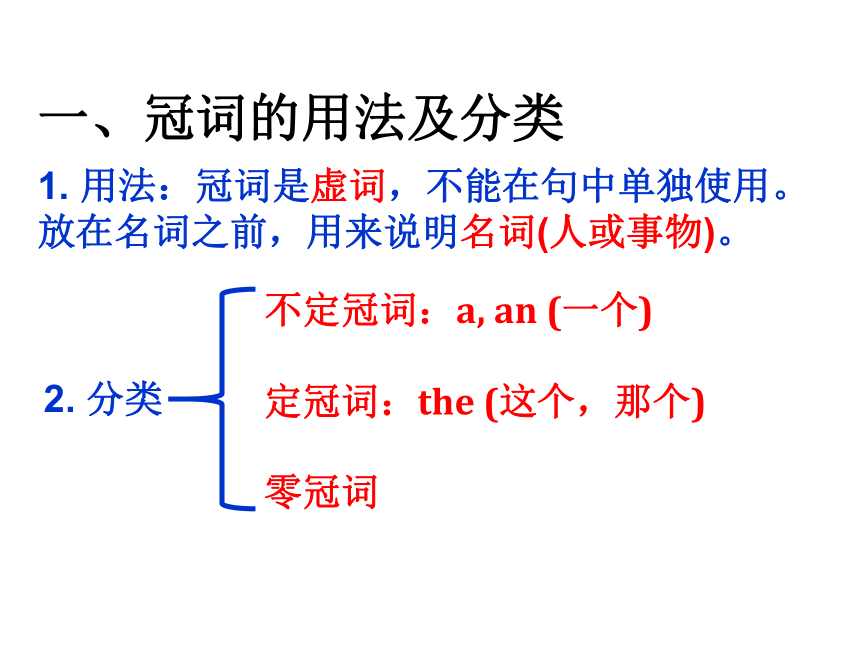
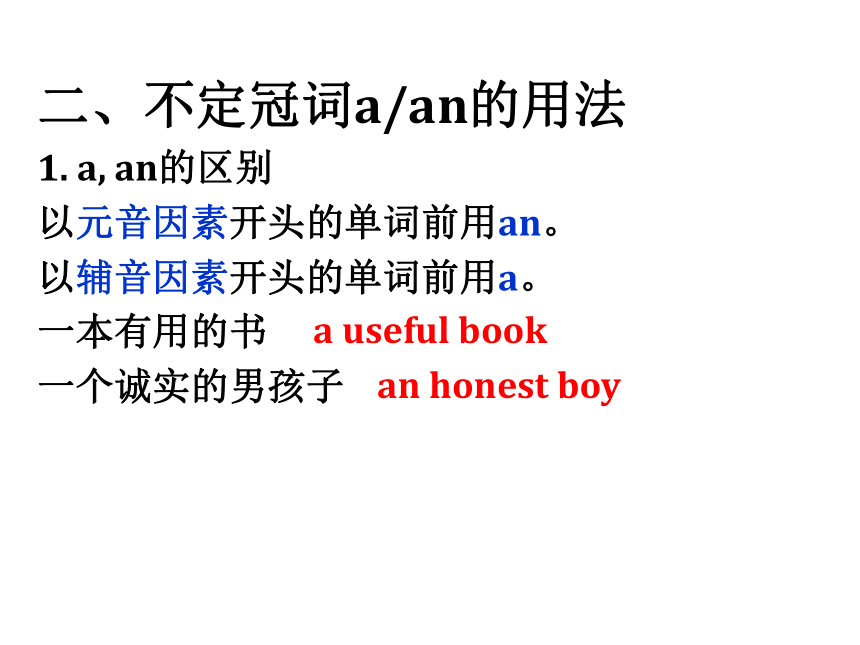
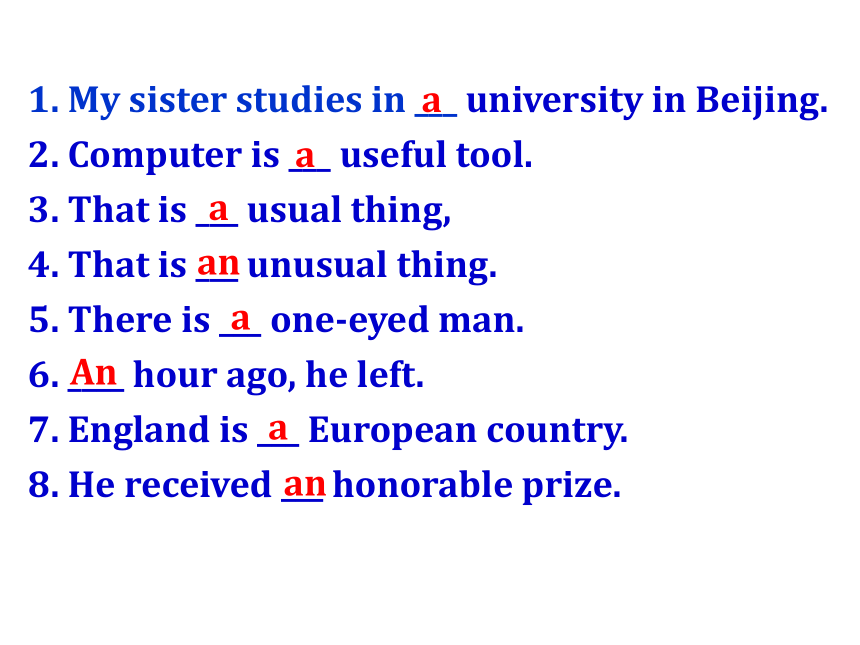
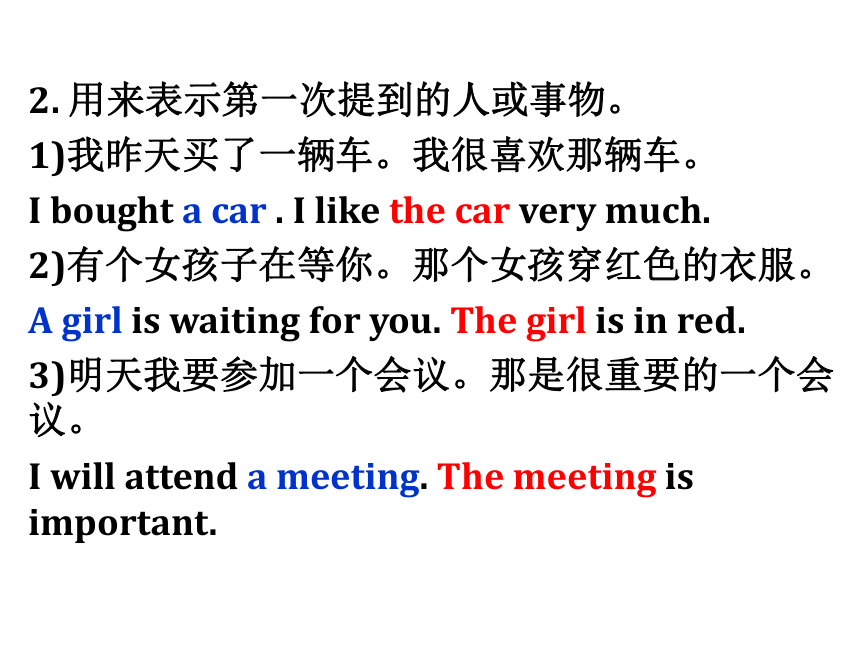
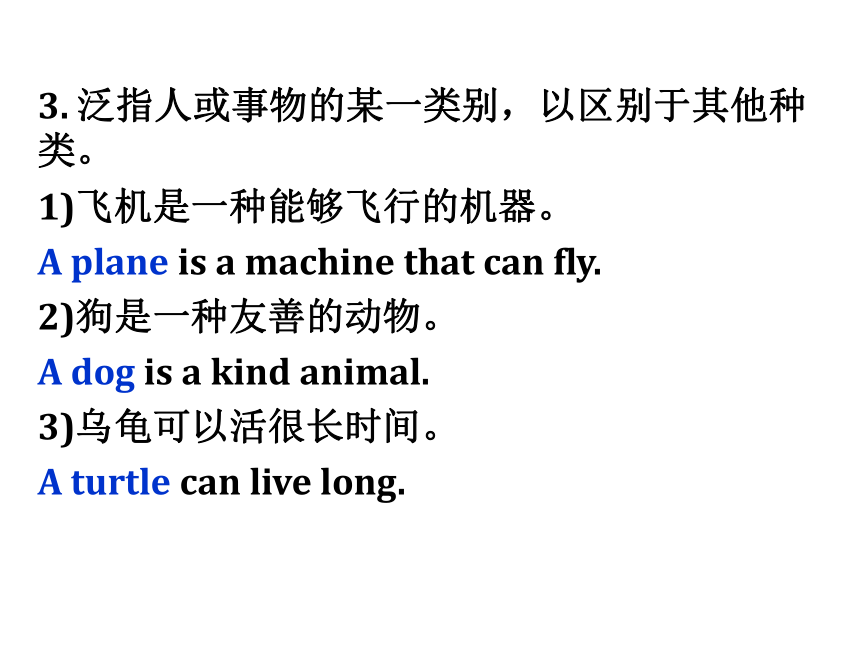
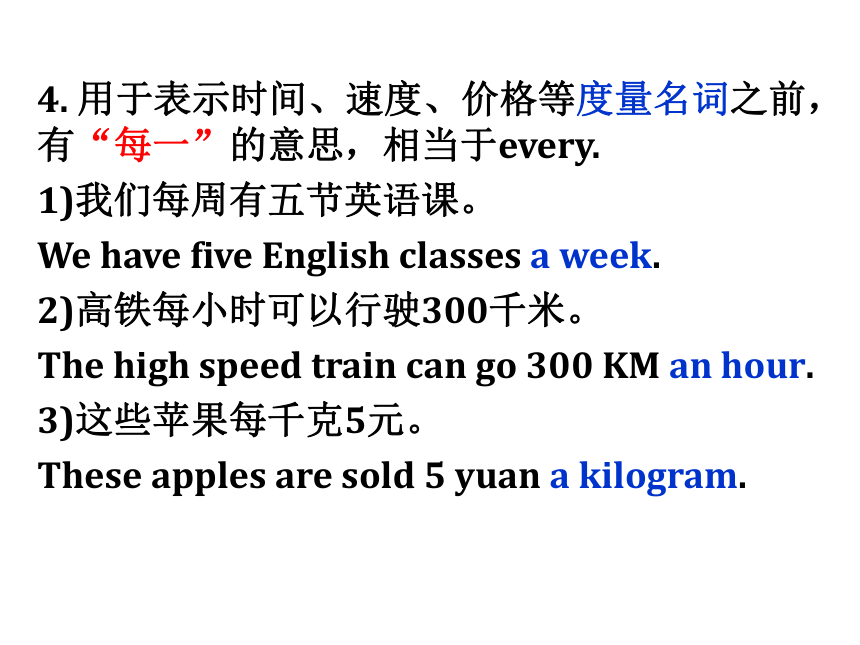
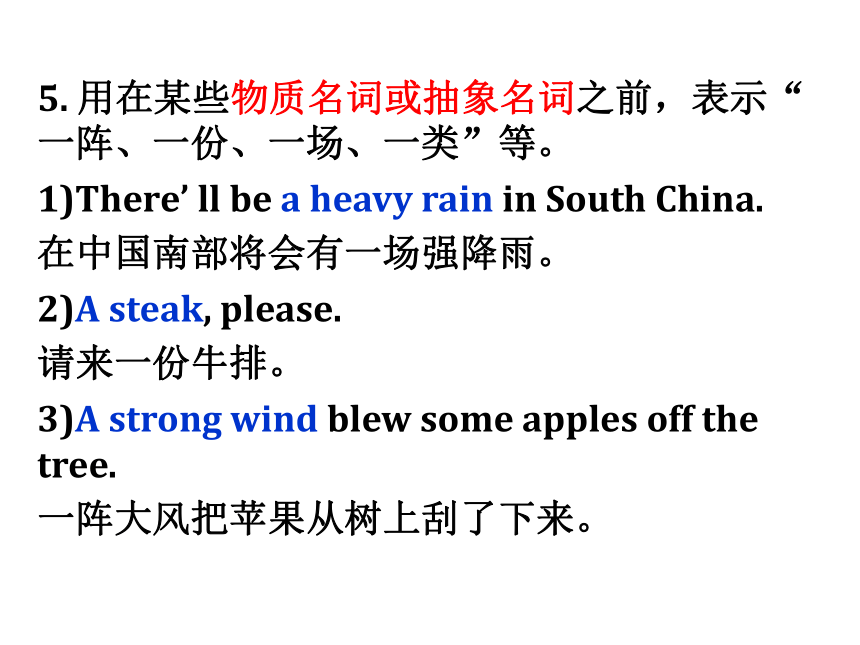
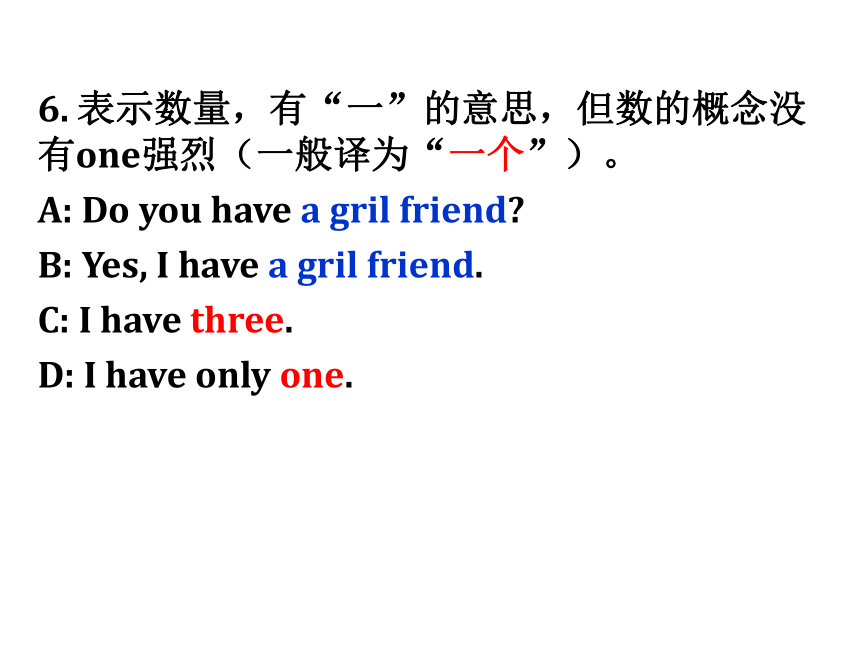

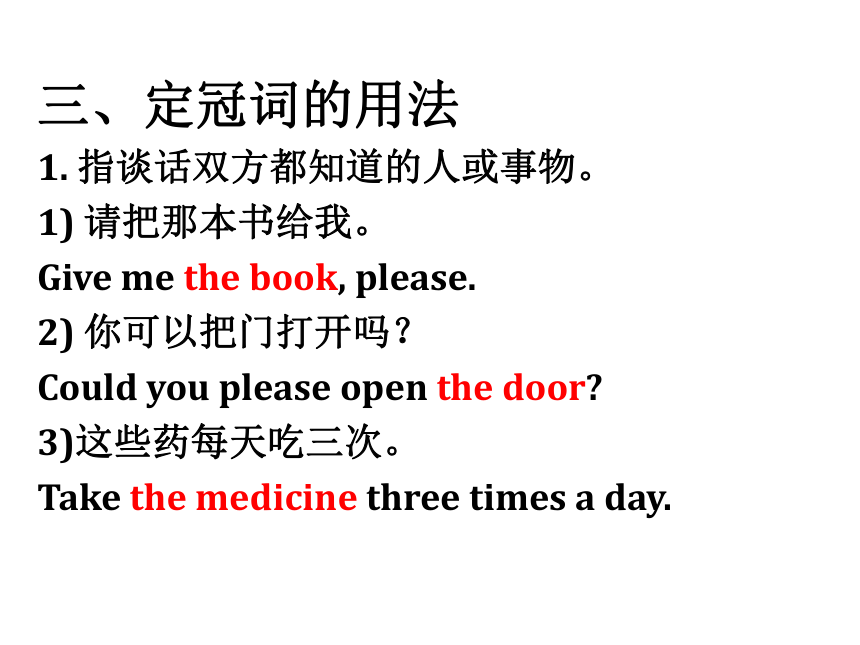
文档简介
(共35张PPT)
2021
中考冠词
学习目录
1、冠词的用法及分类
2、掌握不定冠词的用法
3、掌握定冠词的用法
4、掌握零冠词的用法
5、冠词用法的几个注意点
一、冠词的用法及分类
1. 用法:冠词是虚词,不能在句中单独使用。放在名词之前,用来说明名词(人或事物)。
2. 分类
不定冠词:a, an (一个)
定冠词:the (这个,那个)
零冠词
二、不定冠词a/an的用法
1. a, an的区别
以元音因素开头的单词前用an。
以辅音因素开头的单词前用a。
一本有用的书
一个诚实的男孩子
a useful book
an honest boy
1. My sister studies in ___ university in Beijing.
2. Computer is ___ useful tool.
3. That is ___ usual thing,
4. That is ___ unusual thing.
5. There is ___ one-eyed man.
6. ____ hour ago, he left.
7. England is ___ European country.
8. He received ___ honorable prize.
a
an
An
an
a
a
a
a
2. 用来表示第一次提到的人或事物。
1)我昨天买了一辆车。我很喜欢那辆车。
I bought a car . I like the car very much.
2)有个女孩子在等你。那个女孩穿红色的衣服。
A girl is waiting for you. The girl is in red.
3)明天我要参加一个会议。那是很重要的一个会议。
I will attend a meeting. The meeting is important.
3. 泛指人或事物的某一类别,以区别于其他种类。
1)飞机是一种能够飞行的机器。
A plane is a machine that can fly.
2)狗是一种友善的动物。
A dog is a kind animal.
3)乌龟可以活很长时间。
A turtle can live long.
4. 用于表示时间、速度、价格等度量名词之前,有“每一”的意思,相当于every.
1)我们每周有五节英语课。
We have five English classes a week.
2)高铁每小时可以行驶300千米。
The high speed train can go 300 KM an hour.
3)这些苹果每千克5元。
These apples are sold 5 yuan a kilogram.
5. 用在某些物质名词或抽象名词之前,表示“一阵、一份、一场、一类”等。
1)There’ ll be a heavy rain in South China.
在中国南部将会有一场强降雨。
2)A steak, please.
请来一份牛排。
3)A strong wind blew some apples off the tree.
一阵大风把苹果从树上刮了下来。
6. 表示数量,有“一”的意思,但数的概念没有one强烈(一般译为“一个”)。
A: Do you have a gril friend
B: Yes, I have a gril friend.
C: I have three.
D: I have only one.
7. 固定搭配
a few/little/bit;
have a swim/walk/talk/look/drink/rest;
have a cold;
have a good time;
in a hurry;
for a while;
keep a diary;
do sb.a favor.
三、定冠词的用法
1. 指谈话双方都知道的人或事物。
1) 请把那本书给我。
Give me the book, please.
2) 你可以把门打开吗?
Could you please open the door
3)这些药每天吃三次。
Take the medicine three times a day.
2. 上文中提到过的事物,人,再次提到时要用定冠词表特指。
1) I met ____ strange man yesterday. _____ man had long red hair.
2) We had ____ English lesson today. ____ lesson was very interesting.
3) There was ____ heavy snow last night. _____ snow caused many car accidents.
a
The
an
The
a
The
3. 表示世界上独一无二的事物。
1) 地球比月亮大,但比太阳小。
The earth is bigger than the moon, but smaller than the sun.
2) 中华人民共和国
the People's Repubilc of China
注:国家的全称或缩写前必须用the.
国家的简称前不加冠词,如 in China。
不同国家的人的单复数
名称 总称(谓语用复数) 一个人 两个人
中国人 the Chinese a Chinese
two Chinese
瑞士人 the Swiss a Swiss
two Swiss
澳大利亚人 the Australians an Australian
two Australians
4. 用在序数词、形容词最高级前面,以及对特定的两个人或事物进行比较时的比较级前。
1) 第一课很简单。
The first lesson is very easy.
2) 她是我们班最认真的学生。
She is the most careful student in our class.
3) 他是这两个男孩子当中更年轻的那个。
He is the younger of the two boys.
5. 用在last, only, just, same, very等形容词前,表示特定的某个事物,人。
1) 这是我唯一知道的事。
It is the only thing that I know.
2) 我们有相同的爱好。
We have the same hobby.
3) 我正在找那个能够帮助我的人。
I am looking for the very person who can help me.
6. 用在专有名词前,表示特指。
包括:江,河,湖,海,山脉,岛屿,国家机关、团体等。
太平洋
黄河
教育厅
中国人民共产党
the People's Communist Party of China
the Pacific Ocean
the Yellow River
the Department of Education
7. 表示演奏乐器,乐器前加the。
1) 他会弹钢琴。
She can play the piano.
2) Mary有一把漂亮的小提琴。
Mary has a beautiful Violin.
注:表示数量“一个”时, 不用the。
8. 用在姓氏的复数名词之前,表示一家人或妇二人,做主语时谓语动词用复数。
1) 格林一家人正在看电视节目。
The Greens are watching TV show.
2) 布朗夫妇有两个孩子。
The Browns have two children.
9. 定冠词用于集体名词前,表示特指的复数。
1)The museum is open to the public.
这个博物馆对公众开放。
2)The people in this country are kind and ready to help.
这个国家的人们友善且乐于助人。
10. 用于''越……越……''结构中
在''越……越……''结构中,比较级前的the是不可少的.
1) 越努力,越幸运。
The harder you work, the luckier you will be.
2) 多多益善。
The more, the better.
11.用在逢十的复数名词前,表示年代,也指
人的大约岁数。
1)The young girl is in the(her) twenties.
这个年轻的女孩大约二十几岁。
2)The war broke out in the forties.
这场战争发生在40年代。
12. 固定搭配。
in the morning (afternoon,evening);
in the sky , in the middle (of);
in the end, in the future;
at the moment;
by the way, etc.
四、零冠词的用法
下列情况应免冠,代词限定名词前;
专有名词不可数,学科球棋三餐饭;
季月节假周日期,颜色语种国家人;
交通工具冠词删,称呼习语国简称。
注1:棋类,球类与play搭配时,不加冠词,
但表示数量时,需加冠词。
1) 我经常和我的同学一起踢足球。
I often play football with my classmates.
2) 在桌子下有两个足球和一个篮球。
There are two football and a basketball
under the desk.
注2:若三餐前有形容词修饰时,需要加冠词。
1) 我常在学校里吃午餐。
I usually have lunch at the school.
2) 在妈妈的生日,我们吃了一顿丰盛的晚餐。
On my mother's birthday, we had a big dinner.
注3:名词前用了this, that等指示代词,my, their 等物主代词和some, any 等词时,不再加任何冠词。
1) 这台电脑使他们老师的。
This(The) computer is their teacher’s.
2) Tom是我最好的朋友。
Tom is my best friend.
注4:表示交通方式时,与by连用,不加冠词;与in/on连用需加冠词。
1) by train
2) by plane
3) by car
My father took me to school by car/in his car yesterday.
on a/the train
on a/the plane
in a/the/one's car
五、冠词的特殊用法注意事项
1. 序数词前面用定冠词与不定冠词的区别
“the+序数词”表示“第几……”;
“a/an+序数词”表示“又一,再一”
The cake is delicious,and I would like a second one.
2. 一人兼多个身份的情况,只在第一个名词前加冠词,其他几个不再加冠词。
A teacher and writer is going to come to visit our school next Monday.
备注:如若指不同的人,则两个名词前需要分别加上冠词。
a clerk and a writer
(谓语动词用复数)
3. 在表示季节的名词前一般不用冠词;但如果特指具体某年的某个季节,需用冠词。
in spring 在春天
in autumn 在秋天
in the spring of 2012
I don't like the spring of Beijing. It's too sandy.
4. 在有些短语中,有冠词和无冠词意义差异较大。
go to school
go to the school_
上学
去学校
take place
take the place (of)
发生
取代,代替
If you make more mistakes, I will take the place of you.
be in hospital
be in the hospital
生病住院
在医院
go to church
go to the church
做礼拜
去教堂
by sea
by the sea
乘船
在海边
on earth
on the earth
究竟
在地球上
at table
at the table
What do you want to do on earth?
吃饭
在桌子旁
2021
中考冠词
学习目录
1、冠词的用法及分类
2、掌握不定冠词的用法
3、掌握定冠词的用法
4、掌握零冠词的用法
5、冠词用法的几个注意点
一、冠词的用法及分类
1. 用法:冠词是虚词,不能在句中单独使用。放在名词之前,用来说明名词(人或事物)。
2. 分类
不定冠词:a, an (一个)
定冠词:the (这个,那个)
零冠词
二、不定冠词a/an的用法
1. a, an的区别
以元音因素开头的单词前用an。
以辅音因素开头的单词前用a。
一本有用的书
一个诚实的男孩子
a useful book
an honest boy
1. My sister studies in ___ university in Beijing.
2. Computer is ___ useful tool.
3. That is ___ usual thing,
4. That is ___ unusual thing.
5. There is ___ one-eyed man.
6. ____ hour ago, he left.
7. England is ___ European country.
8. He received ___ honorable prize.
a
an
An
an
a
a
a
a
2. 用来表示第一次提到的人或事物。
1)我昨天买了一辆车。我很喜欢那辆车。
I bought a car . I like the car very much.
2)有个女孩子在等你。那个女孩穿红色的衣服。
A girl is waiting for you. The girl is in red.
3)明天我要参加一个会议。那是很重要的一个会议。
I will attend a meeting. The meeting is important.
3. 泛指人或事物的某一类别,以区别于其他种类。
1)飞机是一种能够飞行的机器。
A plane is a machine that can fly.
2)狗是一种友善的动物。
A dog is a kind animal.
3)乌龟可以活很长时间。
A turtle can live long.
4. 用于表示时间、速度、价格等度量名词之前,有“每一”的意思,相当于every.
1)我们每周有五节英语课。
We have five English classes a week.
2)高铁每小时可以行驶300千米。
The high speed train can go 300 KM an hour.
3)这些苹果每千克5元。
These apples are sold 5 yuan a kilogram.
5. 用在某些物质名词或抽象名词之前,表示“一阵、一份、一场、一类”等。
1)There’ ll be a heavy rain in South China.
在中国南部将会有一场强降雨。
2)A steak, please.
请来一份牛排。
3)A strong wind blew some apples off the tree.
一阵大风把苹果从树上刮了下来。
6. 表示数量,有“一”的意思,但数的概念没有one强烈(一般译为“一个”)。
A: Do you have a gril friend
B: Yes, I have a gril friend.
C: I have three.
D: I have only one.
7. 固定搭配
a few/little/bit;
have a swim/walk/talk/look/drink/rest;
have a cold;
have a good time;
in a hurry;
for a while;
keep a diary;
do sb.a favor.
三、定冠词的用法
1. 指谈话双方都知道的人或事物。
1) 请把那本书给我。
Give me the book, please.
2) 你可以把门打开吗?
Could you please open the door
3)这些药每天吃三次。
Take the medicine three times a day.
2. 上文中提到过的事物,人,再次提到时要用定冠词表特指。
1) I met ____ strange man yesterday. _____ man had long red hair.
2) We had ____ English lesson today. ____ lesson was very interesting.
3) There was ____ heavy snow last night. _____ snow caused many car accidents.
a
The
an
The
a
The
3. 表示世界上独一无二的事物。
1) 地球比月亮大,但比太阳小。
The earth is bigger than the moon, but smaller than the sun.
2) 中华人民共和国
the People's Repubilc of China
注:国家的全称或缩写前必须用the.
国家的简称前不加冠词,如 in China。
不同国家的人的单复数
名称 总称(谓语用复数) 一个人 两个人
中国人 the Chinese a Chinese
two Chinese
瑞士人 the Swiss a Swiss
two Swiss
澳大利亚人 the Australians an Australian
two Australians
4. 用在序数词、形容词最高级前面,以及对特定的两个人或事物进行比较时的比较级前。
1) 第一课很简单。
The first lesson is very easy.
2) 她是我们班最认真的学生。
She is the most careful student in our class.
3) 他是这两个男孩子当中更年轻的那个。
He is the younger of the two boys.
5. 用在last, only, just, same, very等形容词前,表示特定的某个事物,人。
1) 这是我唯一知道的事。
It is the only thing that I know.
2) 我们有相同的爱好。
We have the same hobby.
3) 我正在找那个能够帮助我的人。
I am looking for the very person who can help me.
6. 用在专有名词前,表示特指。
包括:江,河,湖,海,山脉,岛屿,国家机关、团体等。
太平洋
黄河
教育厅
中国人民共产党
the People's Communist Party of China
the Pacific Ocean
the Yellow River
the Department of Education
7. 表示演奏乐器,乐器前加the。
1) 他会弹钢琴。
She can play the piano.
2) Mary有一把漂亮的小提琴。
Mary has a beautiful Violin.
注:表示数量“一个”时, 不用the。
8. 用在姓氏的复数名词之前,表示一家人或妇二人,做主语时谓语动词用复数。
1) 格林一家人正在看电视节目。
The Greens are watching TV show.
2) 布朗夫妇有两个孩子。
The Browns have two children.
9. 定冠词用于集体名词前,表示特指的复数。
1)The museum is open to the public.
这个博物馆对公众开放。
2)The people in this country are kind and ready to help.
这个国家的人们友善且乐于助人。
10. 用于''越……越……''结构中
在''越……越……''结构中,比较级前的the是不可少的.
1) 越努力,越幸运。
The harder you work, the luckier you will be.
2) 多多益善。
The more, the better.
11.用在逢十的复数名词前,表示年代,也指
人的大约岁数。
1)The young girl is in the(her) twenties.
这个年轻的女孩大约二十几岁。
2)The war broke out in the forties.
这场战争发生在40年代。
12. 固定搭配。
in the morning (afternoon,evening);
in the sky , in the middle (of);
in the end, in the future;
at the moment;
by the way, etc.
四、零冠词的用法
下列情况应免冠,代词限定名词前;
专有名词不可数,学科球棋三餐饭;
季月节假周日期,颜色语种国家人;
交通工具冠词删,称呼习语国简称。
注1:棋类,球类与play搭配时,不加冠词,
但表示数量时,需加冠词。
1) 我经常和我的同学一起踢足球。
I often play football with my classmates.
2) 在桌子下有两个足球和一个篮球。
There are two football and a basketball
under the desk.
注2:若三餐前有形容词修饰时,需要加冠词。
1) 我常在学校里吃午餐。
I usually have lunch at the school.
2) 在妈妈的生日,我们吃了一顿丰盛的晚餐。
On my mother's birthday, we had a big dinner.
注3:名词前用了this, that等指示代词,my, their 等物主代词和some, any 等词时,不再加任何冠词。
1) 这台电脑使他们老师的。
This(The) computer is their teacher’s.
2) Tom是我最好的朋友。
Tom is my best friend.
注4:表示交通方式时,与by连用,不加冠词;与in/on连用需加冠词。
1) by train
2) by plane
3) by car
My father took me to school by car/in his car yesterday.
on a/the train
on a/the plane
in a/the/one's car
五、冠词的特殊用法注意事项
1. 序数词前面用定冠词与不定冠词的区别
“the+序数词”表示“第几……”;
“a/an+序数词”表示“又一,再一”
The cake is delicious,and I would like a second one.
2. 一人兼多个身份的情况,只在第一个名词前加冠词,其他几个不再加冠词。
A teacher and writer is going to come to visit our school next Monday.
备注:如若指不同的人,则两个名词前需要分别加上冠词。
a clerk and a writer
(谓语动词用复数)
3. 在表示季节的名词前一般不用冠词;但如果特指具体某年的某个季节,需用冠词。
in spring 在春天
in autumn 在秋天
in the spring of 2012
I don't like the spring of Beijing. It's too sandy.
4. 在有些短语中,有冠词和无冠词意义差异较大。
go to school
go to the school_
上学
去学校
take place
take the place (of)
发生
取代,代替
If you make more mistakes, I will take the place of you.
be in hospital
be in the hospital
生病住院
在医院
go to church
go to the church
做礼拜
去教堂
by sea
by the sea
乘船
在海边
on earth
on the earth
究竟
在地球上
at table
at the table
What do you want to do on earth?
吃饭
在桌子旁
同课章节目录
- 词法
- 名词
- 动词和动词短语
- 动词语态
- 动词时态
- 助动词和情态动词
- 非谓语动词
- 冠词
- 代词
- 数词和量词
- 形容词副词及其比较等级
- 介词和介词短语
- 连词和感叹词
- 构词法
- 相似、相近词比较
- 句法
- 陈述句
- 一般疑问句和否定疑问句
- 特殊疑问句及选择疑问句
- 反意疑问句
- 存在句(There be句型)
- 宾语从句
- 定语从句
- 状语从句
- 主谓一致问题
- 简单句
- 并列句
- 复合句
- 主谓一致
- 主、表语从句
- 名词性从句
- 直接引语和间接引语
- 虚拟语气
- 感叹句
- 强调句
- 倒装句
- 祈使句
- 句子的成分
- 句子的分类
- 题型专区
- 单项选择部分
- 易错题
- 完形填空
- 阅读理解
- 词汇练习
- 听说训练
- 句型转换
- 补全对话
- 短文改错
- 翻译
- 书面表达
- 任务型阅读
- 语法填空
- 其他资料
